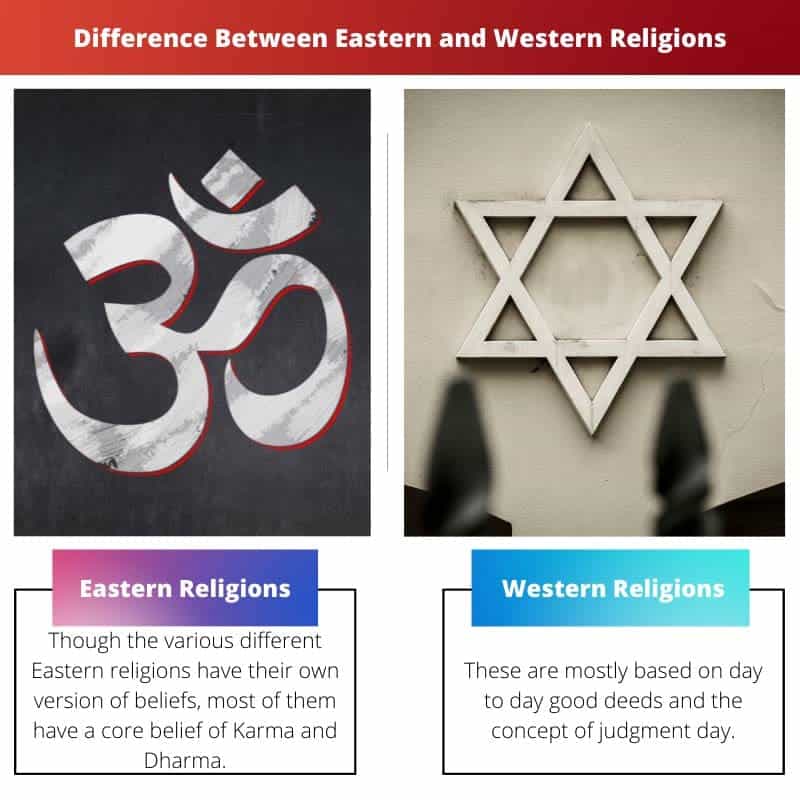Religion has been around perhaps since the very beginning of human existence. There are various religions worldwide with different ideas, beliefs, and faith.
However, it can be divided into two groups one is the Eastern religion, and the other is the Western religion.
Key Takeaways
- Eastern religions like Hinduism, Buddhism, and Taoism focus on spirituality and personal growth through meditation. Western religions such as Christianity, Islam, and Judaism emphasize obedience to God and following specific religious doctrines.
- Eastern religions view the universe as a holistic entity, emphasizing attaining inner peace and harmony with nature. In contrast, Western religions see the world as a dichotomy of good and evil and focus on their struggle.
- In Eastern religions, karma determines the individual’s destiny, whereas, in Western religions, the idea of divine judgment and salvation decides a person’s afterlife.
Eastern vs Western Religions
Eastern religions, such as Hinduism and Buddhism, emphasize the concept of reincarnation and karma and prioritize meditation and self-reflection as a means of achieving enlightenment. Western religions, such as Christianity and Judaism, focus on the belief in a single, all-powerful God.

The Eastern religion, as the name suggests, originated in East and Southeast Asia and is broadly classified into two major parts: the East Asian religions consisting of Confucianism, Taoism, Hinduism, and Shintoism.
The other part consists of the Indian religions: Hinduism, Buddhism, Jainism, and Sikhism.
The Western religion, also called Abrahamic, consists of Islam, Christianity, and Judaism. These are practised in the West, and these influence Western culture.
Comparison Table
| Parameters of Comparison | Eastern Religions | Western Religions |
|---|---|---|
| Beliefs | Though the various Eastern religions have their version of beliefs, most have a core belief in Karma and Dharma. | These are based on day-to-day good deeds and the concept of judgment day. |
| Geography | East and Southeast Asia mostly, though no religion is ever geographically bound. | Mostly in the Western world, no religion is based on boundaries. |
| Existence of Supreme Power | The Eastern religions have varying degrees of polytheists( like Hinduism) to monotheists(like Buddhism) | They are Monotheists who believe in only one God. |
| Consists of | Buddhism, Hinduism, Shintoism, and Confucianism. | Islam, Judaism, and Christianity are the major ones. There are a few minor ones which include Evangelicalism and Catholicism. |
| Outlook on society | Most Eastern religions believe that all living creatures are created equal. | In Christianity, there is a belief that God is above all, followed by humans and then animals. |
What are Eastern Religions?
Originating in parts of Asia, this archetype of religious beliefs consists of worshipping multiple Gods and following the teachings of religious leaders.
One of the most well-known Eastern religions is Hinduism, one of the oldest religions in the world.
Some even say the origins of this religion are the Indus Valley civilization; the teachings of Hinduism are based around the cycle of Dharma, Karma, and Moksha.
The Vedas and the Upanishads are sacred religious texts, and the most important is The Bhagavad Gita, which is supposed to answer all life’s questions.
Another closely related religion to Hinduism is Buddhism, in which Lord Buddha taught his followers how to attain Moksha, enlightenment and freedom from the cycle of birth and death.
Jainism, the followers of Mahavir, too, follow a similar approach to life.
Religions more predominant in other Asian countries include Taoism or Daoism, and they are based on the three jewels of Tao: love, moderation, and humility.
Shintoism practised in Japan is closely related to Buddhism as well.
Confucianism is more than just about religious teachings; it is like a guideline on moral, social, and even political ways of existence and how to live a moral and just life.

What are Western Religions?
Western religions originated from older civilisations like their counterparts in the East.
Christianity, for example, is based on Roman Catholicism, and the belief is in one God who will redeem every one of their sins.
Jesus, son of God, is the redeemer, and if one follows his teachings as given in the sacred book, The Bible, which includes being compassionate towards others, forgiving others who wrong you and repenting your sins and finally, when Judgment day comes.
These everyday good and bad will amount to attaining Heaven or being damned to Hell. Judaism is supposed to have originated in the Middle East during the Bronze Age.
The main teaching of Judaism is that there is only one God, and He wants his followers to be compassionate and show kindness to others.
Islam, too, has its roots in the Middle East; the followers of this religion believe in Muhammad, the messenger of God.
Their religious book, The Quran, teaches Muslims that only one God is all-powerful, all-knowing, and all-forgiving. They also believe in prophets and Judgement Day, much like in Christianity.

Main Differences Between Eastern and Western Religions
- The geographical prosperity of both types of religion is an obvious difference, though no area is exclusive to any religion.
- The belief system Eastern religions are polytheist, while Western religions believe in the existence of only one God.
- There is no “Judgment Day” concept in the Eastern religion, while their counterpart believes in that concept and redeems after that.
- Western Religions believe that their saviour or prophet, as the case may be, is descended from God to help humanity, while Eastern Religions believe that God Himself is the One who will help and save them.
- Worship is a daily process for Eastern religions, while it is more of a periodical in the West.



